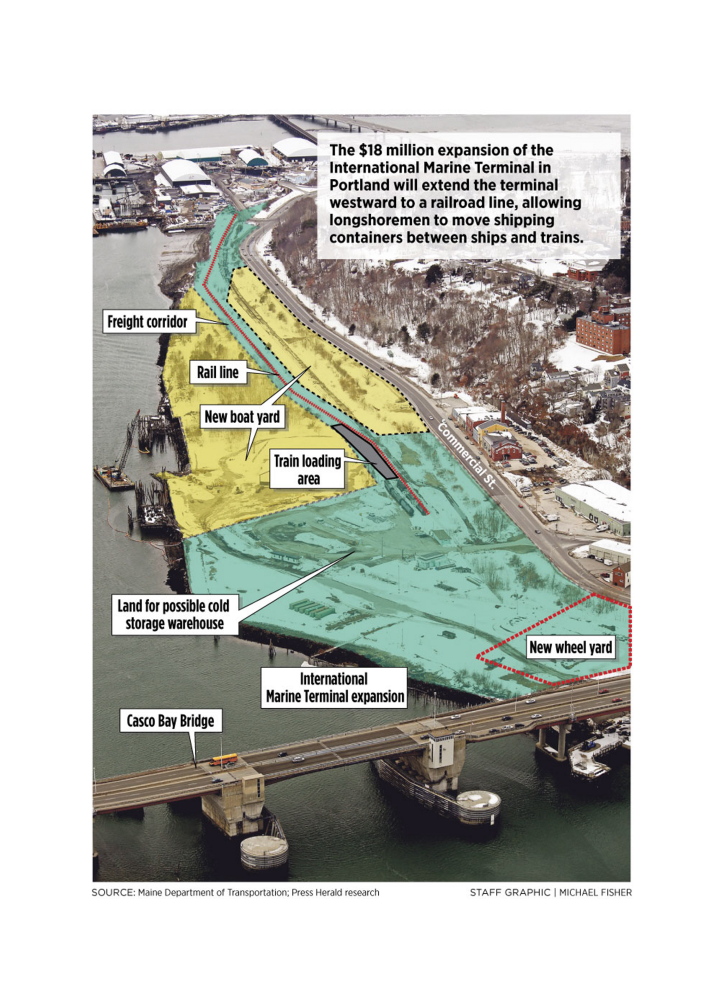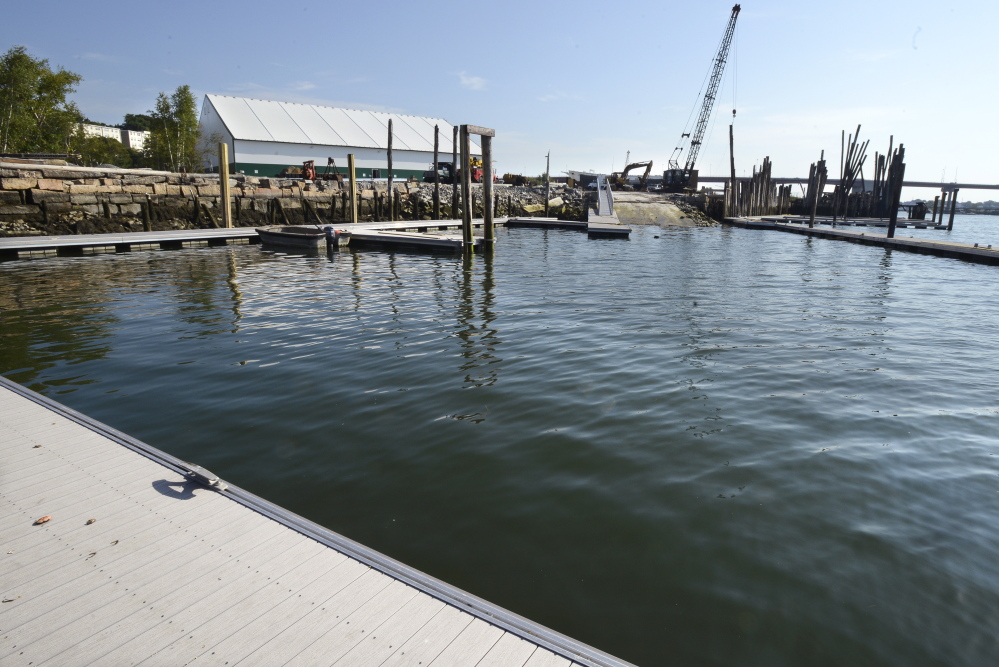The Maine Department of Transportation has paid a Portland businessman $7.2 million for 18 acres of industrial waterfront land it seized from him this spring, more than double what the businessman paid for the same land just two years ago, according to tax records and information obtained by the Portland Press Herald through a Freedom of Access request.
But the businessman, Phineas Sprague Jr., has given the state notice that he will likely challenge the value, a process that could lead to years of litigation.
While the land has been neglected and unused for decades, it’s now in high demand because of the unexpected arrival of an Icelandic shipping service last year at the adjacent container terminal.
The decision by the Eimskip shipping line in March 2013 to make Portland its only port of call in the United States has spurred the state to expand the terminal, which has struggled for years to build a reliable container service.
The project’s first phase, expected to start next month, is an $18 million project to create room for a new “wheel yard” so trucks can drop off and pick up containers. The state will also extend the terminal westward to a railroad line, allowing longshoremen, for the first time, to unload shipping containers from vessels and put them on trains in the same terminal.
In the long term, the state is looking to partner with a private developer to build a cold storage warehouse on the land, a critical step to transform Portland into a major hub for importing, distributing and processing fish.
State officials say that paying more money to Sprague will mean that the state will have less money to spend on future expansion of the container terminal.
“We want to see this resolved as quickly as possible in a way that hopefully allows us to continue to realize the potential of terminal operations here,” said John Henshaw, executive director of the Maine Port Authority.
When it took ownership of the land on April 30, the state gave Sprague $7,180,000 for the land plus $11,045 to reimburse him for property taxes he paid.
It’s difficult to determine exactly how much Sprague paid for the property in 2012 because the transaction involved multiple parties and parcels.
According to information on the real estate transfer tax declaration at City Hall and deed transfer documents at the Cumberland Country Registry of Deeds, Sprague’s company, New Yard LLC., paid Pam Am Railways $1.9 million for just under 15 acres.
In addition, Sprague obtained a long-term lease from Unitil on a 4-acre parcel, and a similar agreement for another 4-acre parcel from Unitil and the Casco Wharf and Storage Co.
Sprague said he paid Unitil more than $1 million in upfront lease payments. As part of the deal, Sprague said he mitigated pollution at the site caused by tar leaking into Casco Bay. A coal gasification plant was once located there.
The city of Portland has assessed the land on the former railroad property at $3.8 million.
DISPUTED DECLARATIONS
The U.S. Constitution allows government agencies to seize private property for transportation projects through eminent domain, but the agencies must compensate owners for the market value of the property.
Sprague’s attorney, Peter Plumb, said the price Sprague paid for the property in 2012 is irrelevant. He said the arrival of the Eimskip steamship line in March 2013 had “dramatically” increased its value.
“It’s not what you pay for it, it’s what it’s worth the day of the taking,” said Plumb. “Phin has made a silk purse out of sow’s ears. That is what he did.”
Sprague, 65, owner of Portland Yacht Service, is moving his boatyard to a site west of the Casco Bay Bridge from the eastern waterfront. Sprague said the move is necessitated by the sale a year ago of his property on the eastern waterfront, the 10-acre Portland Co. complex. The boatyard must be out of the complex by the end of this year, he said.
Despite the state taking 18 acres of his land, Sprague can still develop a new boatyard because he retains five acres on the western waterfront, and he’s buying 12 adjacent acres from the railroad. He declined to disclose the price.
In in the end, he will own 17 acres on the waterfront – five fewer acres than he began with. Additionally, the land will be less useful because it’s narrow and bisected by a rail line, he said.
He says the state’s expansion plans caused him to shelve his original plans for his boatyard near the Casco Bay Bridge, for which he had obtained all his permits, delaying the project by a year and half and adding significant costs.
To determine market value of the land taken by eminent domain, the state hired Gerard McDonough, an appraiser from Newport, Rhode Island, who specializes in waterfront properties and has worked in Costa Rica, Mexico, Panama and the Caribbean.
Sprague also hired an appraiser whose identity he would not disclose. He said the appraisal will be completed by the end of September, and then he will decide whether to file a petition with the State Claims Commission challenging the amount the state paid him. After the commission issues a ruling, either party may appeal to the Maine Superior Court.
Sprague knows the process well. He fought the City of Portland for six years after the city used its eminent domain power to seize easement rights on Sprague’s property on the eastern waterfront so several development projects could move ahead. The city put the value of the easements at a little more than $5,000; Sprague’s appraiser came up with $2 million. After several court rulings, the city ended up paying nearly $1 million, including interest.
Sprague said the process is designed to provide a fair resolution that protects property owners from the “power of the sovereign. ”
While conceding it’s an emotional process, he said he hopes both sides can get though it without bad feelings. After all, his boatyard and the container terminal are neighbors, he said.
“It is what it is,” he said of the process. “The DOT shouldn’t whine, and I shouldn’t whine, either. We are big boys.”
In total, the state has acquired just over 20 acres for the marine terminal project, paying $8.6 million, which included consulting fees. Although Pan Am Railways would not give the state permission to disclose the sum it received for its land, it would appear that the state paid nearly $1.4 million to the railway for a rail corridor of about five acres.
Send questions/comments to the editors.





Comments are no longer available on this story